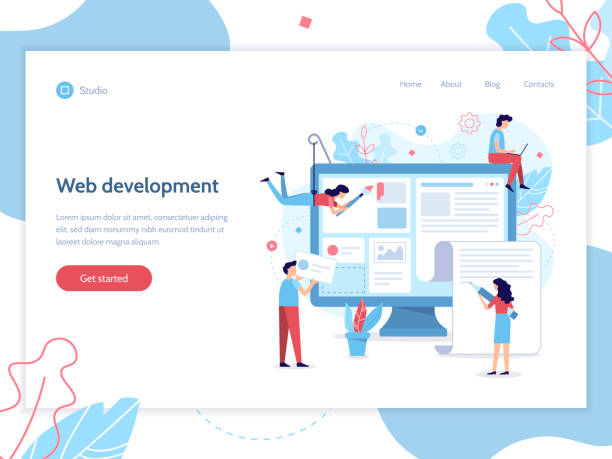
Introduction

Importance of having a website for any online business

In the digital age, having a website is the cornerstone of any online business, laying the foundation for your entrepreneurial journey. It is much more than just a virtual storefront; it’s an essential tool that enables you to reach your target audience, build credibility, and drive sales.
A well-structured, user-friendly, and aesthetically pleasing website not only attracts potential customers but also keeps them engaged, turning casual browsers into loyal customers.
It provides a platform where you can showcase your products or services, share valuable content, and establish your brand identity. Starting an online business website without a website is like opening a store with no entrance – people simply won’t know how to get in and discover what you offer.
Therefore, learning how to make your website is the first, and arguably the most crucial step, in becoming a successful online business entrepreneur.
Each section of this blog post will delve into the details, providing you with a comprehensive guide on how to make a website, a crucial step towards your journey as an Online Business Entrepreneur. Good luck on your journey and don’t forget the golden rule of online business: Have fun, work hard, and stay focused!
A brief overview of the steps to create a website.
To become an Online Business Entrepreneur, the start of any online business begins with knowing how to make a website. The process generally entails several crucial steps.
First, you must decide on the purpose and niche of your website. Then, select a domain name that reflects your business and register it. After this, choose a web hosting service or hosting provider and plan.
The next step is to create a website which involves designing your website layout and structure, which includes selecting a suitable theme, and custom domain, and customizing the design to your preference. You will then need to create the essential pages, such as the homepage, about page, contact page, and product or services page. Adding quality content that resonates with your target audience is key to driving traffic to your site.
Finally, optimize your website for search engines to increase visibility, and continuously update and maintain your website to ensure it meets your business’s and customers’ evolving needs.
With a well-executed website, you are ready to take your online business to the next level.
Additional Steps to Enhance Your Website Performance
To ensure success in the long run, it is important to track performance metrics such as website visits and conversions.
Setting up analytics tracking tools can provide insights into how users behave on your website, enabling you to fine-tune your content and marketing strategies for maximum results.
Furthermore, an effective content marketing strategy is essential for driving organic traffic from search engines to your website.
Regularly creating and promoting quality content on popular channels such as social media can help you build a loyal audience and establish yourself as an authority in your niche. With the right tools and strategies in place, you will be able to take your online business to new heights.
That is why it is important to ensure that your website looks attractive and provides value to users. This includes ensuring that your content is informative and engaging and that its navigation and functionality are easy to use.
Additionally, you should optimize your website for mobile devices so that it displays properly on any device and screen size.
Equally important is to provide a secure and trustworthy environment for users, which requires investing in measures such as an SSL certificate.
By following these steps, you should be well on your way to setting up a successful website that will put your online business on the map.
Finally, keep in mind that running a successful website is not something you do once, but rather it’s an ongoing process requiring dedication and hard work. It takes time and effort to continuously improve your website, grow your audience, and generate more income for your business. Nonetheless, with the right approach and strategy in place, you can succeed in any online endeavor. Good luck.
Planning Your Website

Determining the purpose of your website
Before diving into the technicalities of how to make a website, it’s crucial to first determine the purpose of your website. This first step is pivotal in your journey to becoming an Online Business Entrepreneur. Are you setting up an online store, a blog, a portfolio, or perhaps a news site? Your website’s purpose will dictate its design, functionality, and content.
For instance, an e-commerce site will need a secure shopping cart feature, while a blog would necessitate a user-friendly content management system for regular posts. Understanding the goals and purpose of your website will guide you in crafting a site that is not only visually appealing but also serves as the solid foundation of your Online Business.
Remember, a well-planned website is the start of any successful Online Business.
Identifying your target audience

Identifying your target audience is another essential step in the journey to become an Online Business Entrepreneur. Your audience is not just any Internet user; instead, they are a specific group of people with shared interests, needs, and characteristics who are most likely to benefit from the products, services, or information you offer. Are you targeting millennials, professionals, hobbyists, or perhaps parents?
Understanding who your target audience is will influence your website’s design, functionality, and content strategy. For instance, a website targeted at professionals might adopt a formal tone and design, while a site aimed at millennials might lean towards a more casual, interactive layout.
Remember, being clear about your target audience ensures that you can tailor your website and its content to their needs, contributing to the success of your Online Business. Therefore, knowing your audience is a vital ingredient in the recipe for how to make a website.
Deciding on your website’s content

Deciding on your website’s content is the next step in your pursuit to become an Online Business Entrepreneur. The content of your site is key in attracting and retaining visitors, and it’s a critical aspect of how to make a website. A content strategy will propel your online business to success. Will you be providing informative blog posts, product descriptions, tutorials, or user guides? Or perhaps a combination?
Your content must be engaging, beneficial, and valuable to your target audience. If you’re running an e-commerce site, detailed product descriptions, reviews, and a frequently updated inventory are necessary.
Regular posts about topics of interest to your audience are essential for a blog.
Remember, high-quality, relevant content will keep your audience coming back for more, increase your site’s visibility on search engines, and thus drive the success of your Online Business.
Choosing a Website Platform
Choosing a website platform is a critical decision in the process of how to make a website for your online business. The platform you select will influence the functionality, usability, and manageability of your website. There are numerous website platforms available, each with its strengths and limitations.
For beginners, platforms like WordPress, Wix website builder, or Squarespace are user-friendly, offering a wealth of customizable templates and an intuitive interface.
For more advanced users, platforms like Joomla or Drupal provide more flexibility and complexity. When choosing a platform, consider your technical skills, your website’s needs, and your budget. Also, look for a platform that offers comprehensive customer support, as assistance can be invaluable when you’re starting.
Remember, the right platform will make the process of building and managing your website smoother, contributing to the success of your online business. Hence, choosing a website platform is a vital step in becoming an online business entrepreneur.
Overview of popular website platforms
Let’s delve into some of the most popular website platforms that have enabled countless individuals to become successful Online Business Entrepreneurs.
First, we have the WordPress website, the world’s most popular content management system, known for its flexibility, vast library of themes, and extensive plugin directory. WordPress can accommodate everything from personal blogs to full-featured e-commerce sites.
Next is Wix, a website builder lauded for its intuitive drag-and-drop interface and versatility. It’s ideal for beginners aiming to create visually stunning websites without coding knowledge.
Squarespace is another platform worth mentioning, celebrated for its stylish, professional-looking design templates and full scope of in-built features.
For those craving more complexity and customization, Joomla and Drupal are robust platforms that offer advanced functionalities but require technical know-how.
Understanding the strengths and limitations of each platform will guide you toward making an informed decision, a crucial step in how to make a website for your online business.
How to select the right platform for your business
Selecting the right platform for your website is a critical decision that can largely impact the success of your online business. The right choice depends on several factors including your technical skill level, budget, the type of site you are creating, and future business needs.
For beginners with little to no technical knowledge, a user-friendly platform like a new WordPress website, Wix website builder, or Squarespace could be the ideal choice. These platforms offer an intuitive interface, technical knowledge, and a host of customizable templates simplifying the website creation process.
Those with advanced technical expertise may opt for platforms like Joomla or Drupal for the higher level of flexibility and customization they offer. Additionally, consider the scalability of the platform.
As your business grows, your website will also need to evolve. Therefore, choosing a platform that can accommodate your business’s growth is necessary.
Ultimately, the right platform for your website will effectively balance your needs, skills, and budget, marking a significant step forward in your journey to becoming a successful Online Business Entrepreneur.
Selecting a Domain Name and Web Host

Tips for choosing a meaningful domain name.
Choosing a meaningful domain name is a crucial step for any aspiring Online Business Entrepreneur. Your domain name is effectively your online business’s address, and it should therefore be memorable, concise, and reflective of your brand.
When selecting a custom domain name or your domain name, consider its length and simplicity, as shorter, straightforward domain names are easier for users to remember and type.
Additionally, including keywords related to your business can aid in search engine optimization, making your website more visible to potential customers. It’s also beneficial to choose a domain name that aligns with your brand identity. This aids in establishing brand consistency and recognition.
Lastly, consider the domain extension. While .com is the most popular, other extensions like .net or .biz might be more apt, depending on the nature of your business. Keep in mind, that a well-chosen domain name not only elevates your business’s online presence but also contributes significantly to its success.
Factors to Consider when selecting a Web Host

Selecting a reliable web host is an integral part of launching a successful online business. A web essentially provides the virtual “real estate” for your website. When choosing a web hosting, there are several key factors to consider.
Firstly, assess the speed and uptime reliability of the hosting provider, as these factors directly impact your website’s performance and, consequently, the user experience.
Secondly, consider the security measures the host provides, including firewalls, SSL certificates, and regular backups, to safeguard your website from cyber threats.
Thirdly, evaluate the customer support offered by the host. They should provide 24/7 support through various channels, such as phone, email, or live chat, to resolve any issues promptly.
Lastly, take into account the scalability of the hosting plan. As your business grows, your website’s needs will evolve. Hence, the web host should offer plans that align with your current requirements and can be readily upgraded as your business expands.
Remember, selecting the right web developer host is a crucial step in the journey of becoming a successful Online Business Entrepreneur.
Designing Your Website

Basics of website design
Understanding the basics of website design is a necessity for any aspiring Online Business Entrepreneur. Good website design is more than just visually pleasing aesthetics, it’s about creating a user-friendly experience that encourages visitors to engage with your content and ultimately convert.
The first principle is simplicity; a clean, uncluttered design with intuitive navigation allows visitors to focus on the value your business provides.
Secondly, consistency in design elements like fonts, colors, and images fosters a cohesive visual identity that aligns with your brand.
Thirdly, the website needs to be responsive, meaning it should look and function well on any device, whether it’s a desktop, tablet, or smartphone. Another crucial aspect is loading time; a slow-loading website can frustrate users and lead to higher bounce rates.
Finally, ensure your website design is SEO-friendly by incorporating elements such as an easy-to-follow site structure, appropriate use of headers, and optimized images.
Remember, an effectively designed website is a vital tool in capturing and retaining the interest of your potential customers, marking a significant step on the path of becoming a successful Online Business Entrepreneur.
Importance of user-friendly design
The importance of a user-friendly design cannot be overstated in the realm of online businesses. Having a design that is intuitive and easy to navigate can significantly enhance the user experience, making it more likely for visitors to stay longer, engage more, and return in the future.
User-friendly design is not just about looking attractive; it’s about functionality. It’s about ensuring that every element, from the navigation menu to the contact form, works seamlessly to provide a smooth user journey.
As an Online Business Entrepreneur, remember that your website serves as a virtual storefront. If visitors find it difficult to navigate or fail to find the information they seek swiftly, they’re likely to leave and potentially turn to your competitors.
Conversely, a user-friendly design can boost customer satisfaction, increase conversions, and ultimately contribute to your business’s success.
Thus, focusing on user-friendly design is a strategic move for every aspiring entrepreneur looking to make their mark in the online business landscape.
Choosing the right template and customizing it to your needs

Choosing the right template and customizing it to meet your unique requirements is yet another imperative step in establishing a successful online presence.
The website templates you choose set the initial tone and visual representation of your website, acting as a fundamental framework for your online entity. A well-chosen template will align with your brand ethos, effectively communicate your mission, and resonate with your target audience.
It’s essential to choose a template that offers flexibility and customization options, allowing you to personalize elements like color schemes, fonts, and layouts to match your brand identity.
As an Online Business Entrepreneur, don’t just stop at choosing a template; invest time in customizing it. Add distinctive elements that reflect your brand, incorporate your business logo, pick a color palette that resonates with your brand, and ensure the typography is easy to read.
Remember, your website is a digital extension of your business; make sure it accurately represents your brand and stands out from the competition.
Adding Essential Features
Necessary features for an Online Business Website

For any online business, incorporating certain essential features into your website can be the difference between simply existing online and thriving. First and foremost is a user-friendly navigation system that allows visitors to quickly locate the information they need.
Multiple payment options can significantly enhance the convenience of your customers and increase your conversion rates.
A well-structured ‘”About Us” page helps build trust by providing insight into your business’s mission and values. Engaging, quality content – both textual and visual – can keep your visitors engaged and encourage them to explore your site further. Furthermore, integrating social media icons not only facilitates the sharing of your content but also helps increase your online visibility.
Also, a “Contact Us” page with various contact methods such as an email address, and phone number, with a contact page can improve your business’s accessibility, showing your potential customers that you’re open, transparent, and ready to assist.
Lastly, don’t overlook the importance of mobile optimization – with the majority of internet access happening through mobile devices, a mobile-friendly website is no longer an option but a requirement. Incorporating these necessary features can set your online business on a path toward success.
Adding other features to your website is a crucial step in enhancing its functionality and appeal, thus, increasing its effectiveness as the foundation of your online business. It’s important to consider which features will provide the most value to your audience and align with your business goals.
Features such as a blog page can be beneficial for sharing useful information and insights, consequently establishing your authority in your industry. Including an eCommerce platform allows for the direct selling of products or services, which is a vital feature for many online businesses. A contact form provides an easy way for visitors to get in touch, while social media integration can increase your online presence and foster community engagement.
Implementing these features requires careful planning and technical know-how, so it may be beneficial to seek professional assistance or use website-building platforms that provide these tools. As you build your site, remember to keep usability and mobile friendliness at the forefront of your design decisions. Ultimately, a well-designed and fully featured website is a powerful tool for any aspiring online business entrepreneur.
Adding these features to your website involves both strategic planning and technical execution. Start by mapping out your site structure, and deciding where each feature will be placed for optimal user experience.
Most website builders like WordPress, Wix, and Squarespace offer a variety of plugins and widgets that can easily be integrated to add these features. For example, to add a user-friendly navigation system, you can use the built-in menu editor to customize your site’s navigation bar.
You can integrate eCommerce plugins like WooCommerce or Shopify that support a wide range of payment gateways to offer multiple payment options.
Social media icons can be added using dedicated social media plugins or widgets.
Finally, as mentioned a little earlier, ensure your site is mobile-optimized; most modern templates are responsive by default, but it’s worth checking how your site looks and functions on different screen sizes.
Remember, adding these features is not a one-time task, but an ongoing process to continually improve your website as your business grows.
Optimizing Your Website for Search Engines

Basics of Search Engine Optimization (SEO)
Understanding the basics of Search Engine Optimization (SEO) is a fundamental step in making your website visible to a wider audience. SEO is the process of optimizing your website so that search engines like Google can better understand its content, improving its chances of ranking higher in search results.
There are several aspects to SEO, including keyword research, on-page SEO, off-page SEO, and technical SEO. Keyword research involves identifying the words and phrases that potential customers use when searching for products or services like yours and incorporating these into your website’s content.
On-page SEO refers to optimization techniques that are applied to individual pages on your website, including the strategic use of keywords in titles, headers, and meta descriptions.
Off-page SEO involves efforts to enhance your website’s reputation and authority through backlinks from other reputable sites.
Lastly, technical SEO concerns the backend of your website; ensuring your site is easy for search engines to crawl and index your site.
Remember, SEO isn’t a quick fix but a long-term strategy that can significantly improve your online visibility when implemented correctly.
How to make your website more searchable
Making your website more searchable involves a few strategic steps. First, you should conduct thorough keyword research to understand the terms and phrases your potential customers are using while searching for similar services or products. Tools like Google Keyword Planner or SEMrush can help in this task.
Next, incorporate these keywords into the content of your website, but remember to do so naturally and contextually. Spreading your keywords across your website – in your page titles, header tags, body content, and meta descriptions – can enhance your website’s relevance to these search terms.
Additionally, creating high-quality backlinks from reputable sources can improve your website’s authority, signaling to search engines that your website is trustworthy and reliable. Do not forget to optimize your website’s performance; a fast-loading, mobile-optimized, and secure (HTTPS) website is favored by search engines.
Regularly updating your website with fresh, relevant content also indicates to search engines that your website is active and provides value to users, which can help improve your rankings.
Remember, SEO is an ongoing process, and achieving desired results takes time, patience, and consistency.
Testing and Publishing Your Website
Importance of testing your website before going live

Before your website takes its first steps into the virtual world, it is crucial to thoroughly test every corner. This vital step ensures that your site effectively communicates your business message, functions smoothly, and provides an optimal user experience across different devices and browsers.
The process includes testing the website’s functionality, usability, performance, and security. Functionality testing verifies that all links, forms, scripts, and databases work as intended. Usability testing checks that the site’s navigation is user-friendly, and the content is easy to understand.
Performance testing guarantees the site can handle high traffic and loads quickly, while security testing protects your users’ data. Beyond these, compatibility testing on various devices and browsers is also indispensable in the modern, mobile-first digital landscape.
By investing time in thorough testing, you can launch with confidence, knowing that your website is ready to provide an exceptional user experience, and is poised to fulfill its role in your online business strategy.
How to publish your website and make it available to the public

Publishing your website to make it available to the public is the final step in your journey to becoming an online entrepreneur. Depending on the platform you’ve used to build your website, the process might vary slightly, but the general principles remain the same. If you’re using a website builder like WordPress or Wix, there’s typically a straightforward ‘Publish’ or ‘Go Live’ button you can click.
Before you do so, you need to ensure that you’ve chosen a domain name for your website and that it’s correctly linked to your site. This domain name is your website’s unique address on the internet, and it’s what people will type into their browsers to visit your site.
In addition, you should also set up web hosting for your site. Web hosting is the service that makes your website accessible on the internet. It provides the technology and services needed for your website to be viewed publicly. Once your domain and hosting are set up, you can hit the ‘Publish’ button, and your website will go live.
Don’t forget, that publishing your website is not the end of the journey, but rather the beginning. Regularly updating your website with fresh content, monitoring its performance, and continually optimizing it for search engines are key to your success as an online business entrepreneur.
Additional Tips for Boosting Your Online Business
To ensure your online business thrives, it’s vital to boost your website’s visibility and credibility. Start by prioritizing the creation of valuable, quality content that resonates with your audience. High-quality content is more likely to be shared, increasing your site’s visibility and driving more traffic to your website.
Next, consider engaging in social media marketing. Social media platforms are exceptional tools for promoting your brand and content, reaching a wider audience, and building relationships with customers. Regularly share content from your website on your social media channels and encourage followers to share your posts.
Additionally, consider implementing an email marketing strategy. Collecting email addresses from website visitors allows you to maintain regular contact with potential customers, keep your brand top of mind, and encourage repeat visits to your site.
Finally, always strive to provide excellent customer service. Whether through responsive communication, quick resolution of issues, or simply providing a user-friendly website, exceptional customer service can set you apart from competitors and foster customer loyalty.
By taking these steps, your website will serve not merely as a storefront for your online business, but as a dynamic hub of engagement and growth. Stay adaptable, stay engaged, and keep seeking ways to boost your online presence. The journey of an online business entrepreneur never truly ends, but each step forward is a step toward success.
Conclusion
Recap of the steps
In this journey of crafting your online presence, we’ve walked you through the crucial steps. You began by understanding the importance of a website for any online business and dived into the process of creating one. From conducting comprehensive keyword research and optimizing your website for search engines, to testing every functionality meticulously and ensuring superb user experience, you’ve laid the groundwork for your online business.
The final leap was publishing your website, making it accessible to the public, and setting up your domain and hosting. Remember, this is not an endpoint but the start of your online entrepreneurial journey. Regularly updating your content, monitoring performance, and optimizing your website continuously is key to your ongoing success.
Encouragement for the journey of becoming an online business entrepreneur.
Embarking on the journey to becoming an online business entrepreneur might seem intimidating initially, but remember, every journey begins with a single step, and you’ve already taken that first step by creating your website. The road ahead will undoubtedly be filled with challenges and hurdles, but it’s these very obstacles that will teach you valuable lessons and shape your entrepreneurial journey. As you navigate this exciting path, continue to learn, adapt, and evolve. Seek inspiration from successful online entrepreneurs and don’t hesitate to seek help when needed.
Remember, the internet is a dynamic and vast universe filled with endless possibilities. Stay dedicated, be consistent, and keep your eyes on the goal. With your website as your starting point, there’s no limit to what you can achieve in the world of online business. Believe in your vision, back it with hard work, and you’ll see your online business grow and thrive.